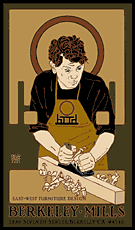Edition of 1627 of which 125 copies are signed 1-125, 26 copies are signed A-Z as artist's proofs. Fifty five dedication copies are signed. No progressives.
October 25, 2002
10 colors 15-7/8½ x 24½
Client:Berkeley Mills, East-West Furniture Design, 2830 - 7th Street, Berkeley CA 94710 Telephone: (510) 549-2854 Web address: www.berkeleymills.com
Model: Gene Agress
1-125: Saint Hieronymus Press
Artist's Proofs: Saint Hieronymus Press
The lyf so short, the craft so long to lerne.
-- Geoffrey Chaucer (c. 1343 - 1400)
The Parliament of Fowls [1380-1386]
Every craftsman believes, deep in his heart, that his trade is the most important of all, and that civilization would come to a grinding, screeching halt if he did not exercise his skills. Actually, he's right. Take away the carpenter, or the weaver, or the baker, and what do you have? A broken machine that quit working because of the failure of one small part. Without these crafts we'd wallow in the mud like animals, cover our nakedness with rude skins and eat boiled groats. Or something equally unpleasant.
There is a most important trade of all, of course, and that trade masters all trades. That is the trade of teacher. To learn something is not enough. Knowledge must be passed along. Knowledge communicated is knowledge improved, strengthened, preserved. The wise craftsman learns first his own trade and then the trade of teacher, understanding that his trade is only half learned until he teaches it to another, and he to yet another, so that the skill does not die out.
The craft takes so long to learn, indeed, that even a lifetime is not enough. The master teaches what he has learned to the apprentice, who learns a bit more and, in turn, transmits that knowledge to a new student. Everything is built on past knowledge. Every craft builds and grows and accumulates tricks of the trade.
What's left after a lifetime of learning a trade are the works of the craftsman's hands, and the skills that have been acquired. Of the two, the more important is knowledge. Things wear out, get broken and lost. Knowledge is passed from hand to hand, from mind to mind, from generation to generation, and its very intangibility is its greatest strength.
Increase your store of knowledge by giving it away.
